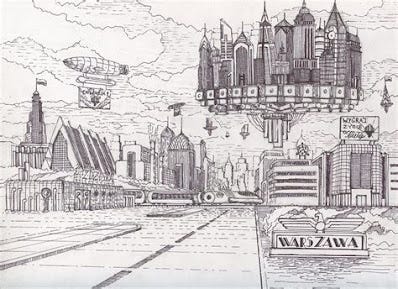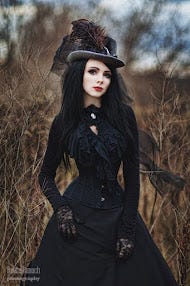Christians and Retrofuturistic Punk: Redeeming the Genre
Say "punk" in front of many Christians, and they'll make a face. Sometimes it's a scrunched up face of disgust, other times it's just a eyebrow twitch of surprise. Punk is a genre of rebellion, dissatisfaction, and anger. This post will take a look at a very small subset of punk, retrofuturistic punk in literature, and discuss some ways it can be redeemed into a way to spread the hope of the Gospel.
What is retrofuturistic punk?
The retrofuturistic movement takes past time periods and imagines what they would have been like if technology had been much more prevalent. It falls under the genre of speculative fiction, and incorporates one or more of spec fic's subgenres: most often fantasy, alternate history, and/or science fiction. (Additionally, spec fic can include the paranormal.)
Punk is a genre, worldview, or style of expression characterized by cynicism, featuring marginalized, disillusioned, and rebellious main characters.
Retrofuturistic punk includes cyberpunk, steampunk, and a number of related sub-genres.
This graphic shows how they are connected.
Cyberpunk emerged first, it's usually set either in megacities or in a virtual world, and involves computers and internet/web-based technologies.
Steampunk emerged as a reaction to cyberpunk, as it takes a similar urban, technology-dependent look at society, except the technology is set in the Victorian era and is powered by stream. In addition to Victorian influences, steampunk often pulls from goth and art deco influences
Steampunk set on the American frontier (as opposed to in England, which is the norm) is known as cattlepunk.
Clockpunk is a similar idea to steampunk, but instead of steam driven technology, it draws before the industrial revolution, from Renaissance technology (Think Leonardo daVinci.) The fantastical technology in clockpunk is usually powered by a wind-up mechanism.
Diesel Punk is a futuristic look at the 1920s-40s and differs from steampunk in that it includes the internal combustion engine instead of the steam engine. It usually features a main character of low social standing, has a aesthetic of "grime and glamor," and features technology that's large and on a broad scale.
Art Deco steampunk
Goth steampunk
Gaslamp Fantasy (also called Gaslight Fantasy, or Gaslamp Romance) is similar to steampunk in aesthetic, but it often includes more magic and is lighthearted instead of dark or gritty. Because of this, it is not always punk per se, but it is retrofuturistic, It also is more likely to, but not always, include romance. It also covers a wider range of time, featuring Regency and Edwardian settings as well as Victorian ones.
Why should Christians consider writing in these subgenres?
Christians should spread the Gospel into all the world, and if Christians avoid large subgenres, they miss out on an opportunity to bring the Gospel to the part of the world that reads in those subgenres. Retrofuturistic books are popular, and they have the potential to carry great commentary on proper uses of technology, how society should be, what is morally right and wrong, and what the "punk" main character reveals about the heart of man.
Technology and Science.
Retrofuturistic books by definition put a huge emphasis on technology and science. While we're not used to cogs and gears perhaps, technology plays a huge part of our lives today, affecting everything from how we get around, how we communicate with people, how we create art, what we wear, what we eat, how we clean our houses, even how we think. These things can seem mundane, but they are all ways we can give glory to God. In addition to doing good, technology can be used for great evil and cause a lot of damage, including encouraging laziness and discouraging socialization.
In addition, many people, including Christians, have this idea of God and science being opposites. However, there is great beauty and order in the rules and patterns of science. These speak of an infinite, wise, majestic God, who lovingly pays attention to details so that humans, mere "inflatable mud" as one pastor put it, don't burn up, starve, suffocate, or get fried by cosmic radiation.
Unfortunately, many books in which technology and science play large roles seem to be "sterilized" of God, since including God might come across as "old fashioned" or even "simplistic." There is a need for God-glorifying science in fiction; and because God is timeless and complex, there is no good reason to leave Him out.
Social Commentary.
A major theme in retrofuturistic literature are the issues involved with classism, poverty, and racism. The Bible also has a lot to say about this too, however, it takes a bit of a different view than most secular commentary. Here is a timeline with major scientific, political, and religious movements on it. The Victorian age saw a number of prominent atheists and deists, since during the previous Age of Enlightenment/Reason, philosophers had "reasoned" themself away from a personal God. However, there was still a decent amount of religious influence and history, though it's not often portrayed positively in fiction stories.
Ethics and Morality.
The main characters of retrofuturistic punk stories tend to have major character flaws and be morally grey, following the anti-hero trend that's in a lot of today's media. Infidelity, oppression the lower classes, and an "ends justify the means" mindset were rampant during the Regency, Victorian, and Edwardian eras.
One individual may want to write a story with an upright character with strong, Christian convictions. Another believer may want to write a morally gray character. Both characters, though, will have to grapple with the moral values of their society. The upright character will, naturally, be surrounded by other characters without the same values.
Today, Christians are still surrounded by values we don't agree with, so this first example, handled well, has the potential to offer encouragement and fortitude to the believer struggling with not being conformed to the world.
The second, morally gray, character will also grapple with the moral values society promotes, because as a Christian, the author understands that there is right and wrong, even if the character doesn't. Writing platform Story Embers has an entire section of articles on expressing ethics in writing.
Some people might still be concerned about the rough, rebellious nature of the "punk" part of this genre. This leads to the fourth point mentioned a few paragraphs ago.
All Mankind are Punks.
When left to their own devices, everyone is rebellious. Everyone is arrogant and self-seeking. Everyone is willing to bend the rules if it gets them what they want. Without God, mankind is pretty despicable. The Bible informs us of this in Jeremiah: "The heart is deceitful above all things, and desperately wicked, who can know it?"
The punk genre takes a raw look at the nature of sin, and it offers a base that Christians can build on to demonstrate the transforming nature of God's love. Because God loves punks. But He doesn't want them to continue in their rebellion. He took our messed up, doomed-to-the-shredder draft, and gave us a real, morally perfect Hero. That Hero offers us an unimaginable character arc, called sanctification.
So why do Christians neglect punk genres when they offer such a fitting, potent way to introduce the love of Jesus to a strong niche of readers who need Him?
Here's to the sanctified punks. God bless.










